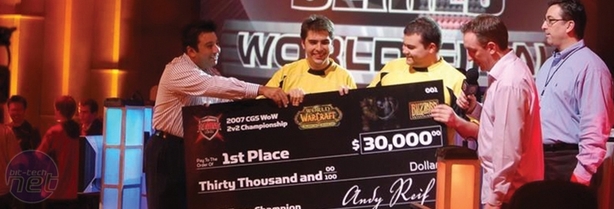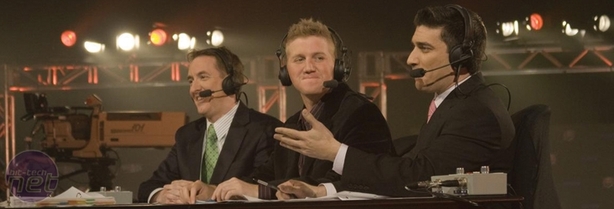Does Professional Gaming Have a Future?
April 10, 2009 | 09:29
Companies: #bit-tech #esports #world-cyber-games

The Death and Rebirth of eSports
Three years ago the future of professional gaming seemed bright. The big names such as Jonathan ‘Fatal1ty’ Wendell and Sander ‘Vo0’ Kaasjager were earning hundreds of thousands of dollars in competitions. The mainstream media, its interest piqued by the idea of geeks becoming rich through gaming, took notice. MTV had televised the 2005 CyberAthlete Professional League final, and enthusiasts began to imagine a future in which professional gamers would, it was hoped, be revered in the same way as sporting heroes such as David Beckham. Gaming contests would take place in huge arenas before vast crowds of screaming fans, with millions more watching on TV.Sky helped to launch the Championship Gaming Series, and each match was shown on Sky’s mainstream channels, along with channels in the USA and Asia. May 2007 saw the launch of XLeague.TV, a channel dedicated to gaming, with a professional sporting approach at its core. Unfortunately, neither initiative proved to be successful. X-League.TV lasted 18 months, while Sky pulled the plug on CGS late last year. Other signs have been equally discouraging. The Cyberathlete Professional League, now owned by a group from the United Arab Emirates, hasn’t staged any competitions for the past two years. The World Series of Video Games, the league that many people thought would take up its mantle, has also collapsed. A recent story in the New York Times collected dispiriting tales from pro gamers affected by the closure of competitions and leagues. Has all the excitement and promise of pro gaming come to nothing?
The pot of gold at the end of the pro gaming rainbow
Maybe not. Behind all this bad news, there are people out there who are making a living from eSports. Huge events that attract thousands of spectators and give away hundreds of thousands of dollars in prize money still take place. While some leagues have gone to the wall, others are quietly flourishing, and many people are passionate about putting professional gaming on the map. Perhaps eSport isn’t dying – it might just be growing up.
The Organisations
It’s still possible for a lone-wolf player to rise through the rankings, become noticed and play in the big leagues, but these days most players play as a member of clans or teams, which take part in leagues and competitions. Welcome to the biggest challenge in making sense of the professional gaming scene – there’s no global hierarchy or organisation of teams, as there is in football with FIFA, UEFA and the British FA, for example. Instead, the competitive PC gaming scene has several different, and mostly unrelated, leagues and championships, all with their own rules, regulations, systems and games.Globally speaking, there are two big names. The World Cyber Games is an annual tournament, currently sponsored by companies such as Samsung and Microsoft, that attracts more than 1.5 million competitors. It begins early in the year with online, regional and then national competitions, from which finalists are drawn to compete in the Grand Final in November. In the UK, online qualifiers are run during July with a live ‘last chance’ qualifier taking place before the national final at Multiplay’s M-Festival LAN gaming event in August.
Jonathan 'Fatal1ty' Wendell, centre, opines on some pro gaming action for the Championship Gaming Series
The WCG seems to regard itself as an eSports Olympics, with more of a focus on national teams and medal tallies than individual stars and big cash prizes – although with nearly $500,000 splashing around, the competition isn’t short in that department. Counter-Strike 1.6, StarCraft and WarCraft III make up the PC portion of the line-up this year, with other games to be announced.
The WCG’s closest rival is the Electronic Sports World Cup. Conceived by a team of French game enthusiasts back in 2003, it now covers 50 different countries, each of which holds its own national qualifier. Games include Counter-Strike 1.6, Quake 3 Arena, Trackmania Nations Forever and Warcraft III. The prize pot is smaller than that offered by WCG, but the competition remains intense. What’s more, an additional ESWC Masters event, most recently held in Athens, brings together the crème de la crème of gaming talent.

MSI MPG Velox 100R Chassis Review
October 14 2021 | 15:04











Want to comment? Please log in.